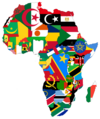University of Asmara
 | |
| Type | Public |
|---|---|
| Active | 1958–2006[1] |
| President | Tadesse Mehari (2004 - 2007) |
| Location | , 15°20′33″N 38°55′39″E / 15.34250°N 38.92750°E |
| Website | www |


The University of Asmara (UoA) was a public university in Asmara, Eritrea. The nation's first university, it was founded in 1958 by the "Piae Madres Nigritiae" (Comboni Sisters). The school was meant to provide for the local population, though its initial enrollment in the 1950s was entirely Italian.[2] Over the course of its history it has been reopened and reorganised following political changes. In 2006 it was closed[clarification needed] and reorganized into other institutions such as the Eritrea Institute of Technology.[3][1]
History
The university was founded as the "Catholic College of Santa Famiglia" in 1958 by the "Piae Madres Nigritiae" (Comboni Sisters). In 1964 the university had been renamed as "University of Asmara" and began offering Associate Diploma programs in the arts, commerce, and the sciences. The roots of the university are connected to the 1940s when Dr. Vincenzo Di Meglio promoted the creation of the "School of Medicine" in Italian Asmara. It is also linked historically to the Istituto Italiano Statale Omnicomprensivo di Asmara.[2][4][5]
..it is noteworthy to remember that the "University of Asmara" was created by Italian religious organizations. Indeed The University of Asmara (UoA) was the nation's first university, and was founded in 1958 by the 'Piae Madres Nigritiae' (Comboni Sisters). The school was meant to provide for the local population, though its initial enrollment in the 1950s was entirely Italian. The university was founded with the name "Collegio Cattolico della Santa Famiglia": the roots were in the 1941 "Scuola di Medicina", linked to the Asmara Hospital (then named "Regina Elena"). In the early years, the curriculum reflected Italian educational plans, and courses were taught in Italian with a view to preparing students to receive the "laurea" (degree) from a university in Italy. In 1958, members of the missionary congregation 'Piae Madres Nigritiae' or Comboni Sisters began private education classes for 10 Italian female students: the "Holy Family University Institute" was founded by the Italian Sister Marianora and Sister Fosca. B. D'Ambrosio[4]
In 1979 the new president pushed through a major reorganization of the curriculum and structure. The next years saw an increase in students from 300 to 2700. New courses, staff, day and evening extension programs and campus buildings revived the university, together with a bilateral agreement to exchange students and faculty with the University of Addis Ababa, particularly focusing on graduate training in Addis Ababa to produce faculty for Eritrea.[2] In the 1980s, the Arid Zone Agricultural College was established as a faculty.[6]
After Eritrean independence
The university stopped new student enrollments in 2003. In 2003, the government issued a directive re-configuring prospective students to one of five tertiary education institutions that opened after new admission to the university was stopped such as the Eritrea Institute of Technology. The Eritrean government worked out in its program that the university was restructured and its resources reallocated to new institutions of higher education.
See also
References
- ^ a b Ginbot, Zekarias (3 February 2015). "The Sarcasm, Denial and Lies of the Eritrean authorities: a personal account on the National service, the closure of the University of Asmara and the Scholarship program in South Africa – Part III – Assenna.com". Assenna. Retrieved 2021-10-11.
- ^ a b c "University of Asmara: A Brief History". uoa.edu.er. 2005. Archived from the original on 29 September 2011. Retrieved 2006-09-02.
- ^ Rena, Ravinder (2007) "Challenges For Higher Education In Eritrea In The Post-Independent Period To The Present– A Case of Asmara University", Argentine: Working Paper No.14, pp.1-13 Published (on 2 August 2007) by the Argentine Center of International Studies. "Asmara University has been closed by September 2006. All the existing staff and students are assimilated with that of newly established Eritrea Institute of Technology and other related colleges. It assumed that the university will start again with post-graduate and research programmes in the country."
- ^ a b "Eritrean regime's next target: the Italian School of Asmara". Eritrea Hub. Agenzia Fides. 14 September 2020. Archived from the original on 4 March 2021. Retrieved 2021-10-11.
{{cite web}}: CS1 maint: others (link) - ^ Paolo, Nicky Di. "La Scuola di Medicina di Asmara" [The School of Medicine of Asmara] (PDF). www.ilcornodafrica.it (in Italian).
- ^ "General Information As of January 1, 2018". Mekelle University. Retrieved 6 October 2018.
Bibliography
- Killion, Tom (1998). Historical Dictionary of Eritrea. The Scarecrow Press. ISBN 0-8108-3437-5.
- Feagles, Shelley M. (1999). A Guide to Educational Systems Around the World. Washington, D.C.: NAFSA: Association of International Educators. ISBN 9780912207834.

